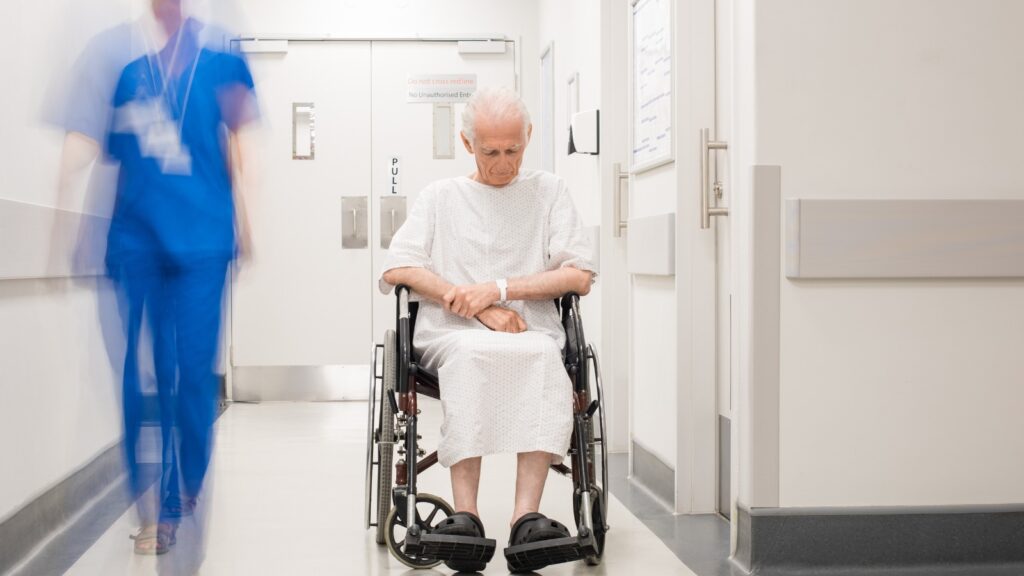Being sent home from the hospital too soon can have devastating consequences — from delayed recovery to life-threatening complications. In Pennsylvania, premature hospital discharge is not just a healthcare issue; it can also become a legal one if it violates established standards of care.
This article explores what constitutes early hospital discharge, whether it qualifies as medical malpractice under Pennsylvania law, and what steps you can take if you or a loved one has been affected.
What Is Premature Hospital Discharge?
Premature hospital discharge refers to a situation in which a patient is released from medical care before they are clinically ready to leave. This can include cases where symptoms are unresolved, vital signs are unstable, necessary tests have not been completed, or there is no discharge plan or follow-up care in place.
Patients may be discharged early due to administrative pressures, insurance constraints, or misjudgments by medical staff. However, when such a discharge leads to deterioration in a patient’s condition, hospitalization shortly after, or even death, it raises serious concerns — both medical and legal.
In simple terms: if you were still sick, recovering from surgery, or not given proper care instructions when you were sent home, your discharge may have been premature.
Key Indicators of Premature Discharge
- Discharge occurred while symptoms or vital signs were abnormal
- No clear instructions or medication plan were provided
- The patient or family voiced concerns that were ignored
- There was no follow-up care arranged or scheduled
- The patient had to be readmitted shortly after discharge
Is Early Discharge Considered Medical Malpractice in Pennsylvania?
Not every early discharge qualifies as malpractice. However, under Pennsylvania law, if a hospital or healthcare provider breaches the medical standard of care — and that breach causes injury — then it may constitute medical malpractice.
To bring a successful claim, it must be shown that the discharge was not aligned with what a competent medical professional would have done under similar circumstances. Pennsylvania courts recognize that hospitals and doctors have a duty to make discharge decisions that prioritize patient safety and recovery.
For example, discharging a patient after surgery while they are still showing signs of infection, without scheduling a follow-up, and ignoring post-operative complications could be considered negligent. If this negligence leads to worsened conditions, rehospitalization, or long-term harm, legal action may be warranted.
To prove medical malpractice, the following elements must be established:
- Duty of care — The hospital or doctor owed you a standard duty of medical care.
- Breach of duty — That standard was breached through premature or inappropriate discharge.
- Causation — The breach directly caused or contributed to your harm.
- Damages — You suffered quantifiable losses, such as physical injury, medical expenses, emotional distress, or lost income.
Common Scenarios That May Lead to a Legal Claim
Many malpractice claims arise from discharge decisions made without full consideration of a patient’s condition or care needs. In Pennsylvania, some of the most commonly litigated scenarios include:
1. Post-Surgical Discharge Without Adequate Recovery
Patients recovering from surgery need close monitoring. If a patient is sent home while still experiencing post-operative complications — such as bleeding, fever, or pain — and suffers worsening health as a result, a malpractice claim may be viable.
2. Elderly Patients Released Without Support
Older adults are particularly vulnerable to complications from early discharge. Hospitals have an obligation to ensure these patients have access to safe environments and care when released. Sending them home alone or without assistance may constitute negligence.
3. Patient Or Family Concerns Are Dismissed
Sometimes, patients or their families express that the patient is not ready to leave, yet they are still discharged. If harm follows, this lack of due diligence can be a factor in a malpractice case.
4. Failure To Follow Established Discharge Protocols
Hospitals often have formal checklists and procedures to ensure patients are ready to be discharged. Skipping these steps — or discharging a patient without confirming recovery benchmarks — may breach the standard of care.
How Pennsylvania Law Protects Patients
In Pennsylvania, medical professionals are held to a defined “standard of care.” This means that their decisions, including those regarding patient discharge, must reflect what a reasonably competent provider would do in similar circumstances.
When a healthcare provider releases a patient prematurely, and the decision deviates from medical best practices or endangers the patient, legal liability may arise.
Hospitals and healthcare systems are also required to implement discharge planning procedures that include:
- Confirming that the patient is medically stable
- Providing detailed written instructions for at-home care
- Arranging follow-up visits or specialist care
- Ensuring the patient understands medication usage
- Coordinating with family or home healthcare services as needed
If any of these steps are missed or rushed, and the result is harm to the patient, the law provides a pathway for accountability.
What Are Your Legal Options?
If you believe that your or your loved one’s premature hospital discharge resulted in harm, there are several legal and administrative avenues available in Pennsylvania.
- Filing A Complaint With The Pennsylvania Department Of Health
You can report hospitals or medical facilities for unsafe discharge practices. The department may investigate and, in some cases, take regulatory or disciplinary action against the institution. - Consulting With A Pennsylvania Medical Malpractice Attorney
A qualified attorney will assess your case, help gather evidence, and determine whether you have a valid legal claim. Many malpractice lawyers offer free consultations and work on contingency — meaning you don’t pay unless they win your case. - Filing A Malpractice Lawsuit
If your case meets the legal standards for malpractice, you may be entitled to compensation for:
- Medical expenses (past and future)
- Lost wages or loss of earning capacity
- Pain and suffering
- Permanent disability or long-term care costs
- Emotional distress and loss of quality of life
How to Prove Premature Discharge Caused Harm
To successfully hold a hospital accountable, you’ll need to present strong, well-organized evidence. This often involves collecting documentation, timelines, and expert testimony to build a compelling case.
Essential types of evidence may include:
- Hospital records and discharge summaries that show the patient’s condition at the time of release
- Doctor’s notes or test results that contradict the decision to discharge
- Emergency room or readmission records showing that the patient had to return for care
- Statements from family or caregivers who raised concerns
- Expert medical opinions confirming that the discharge fell below the standard of care
Your attorney will help coordinate this evidence, often working with medical experts to demonstrate how the discharge was inappropriate and caused your injuries.
Real-World Case Examples
While individual outcomes vary, there have been multiple lawsuits in Pennsylvania involving premature discharge that resulted in settlements or verdicts for the patient.
These cases often involve:
- Surgical patients discharged too soon who later develop infections or need emergency surgery
- Elderly patients sent home without support who later fall, suffer strokes, or face fatal complications
- Patients discharged from the emergency room despite ongoing serious symptoms like chest pain, confusion, or breathing difficulty
These legal actions not only help victims recover financially, but also encourage healthcare providers to improve their standards of patient safety.
What to Do If You Were Discharged Too Early
If you suspect you were harmed due to premature discharge, here are the immediate steps to take:
- Request your medical records from the hospital.
- Document everything, including symptoms, dates, and communications with doctors.
- Seek a second medical opinion to assess your current condition and care needs.
- Contact a Pennsylvania malpractice lawyer to review your case.
- File a complaint with the Pennsylvania Department of Health if appropriate.
Frequently Asked Questions About Premature Hospital Discharge in Pennsylvania
Can I sue a hospital in Pennsylvania for sending me home too early?
Yes, you can potentially sue a hospital if the early discharge violated the standard of care and resulted in harm. In Pennsylvania, hospitals and healthcare providers have a legal duty to ensure that patients are discharged only when it is medically appropriate. If you suffered complications, had to be readmitted, or your condition worsened due to being sent home too soon, you may have grounds for a medical malpractice lawsuit.
What qualifies as premature discharge under Pennsylvania malpractice law?
Premature discharge typically refers to any situation where a patient is released from medical care before it is safe to do so. This could include discharging a patient with unstable vital signs, unresolved symptoms, without a proper follow-up care plan, or against medical advice without proper documentation. To be considered malpractice, the discharge must directly contribute to the patient’s harm or deterioration and must deviate from accepted medical standards.
Is early hospital discharge always considered malpractice?
No, early discharge is not automatically considered malpractice. There are cases where patients may be discharged early without negative outcomes. However, if the decision to release a patient was negligent, rushed, or made without proper evaluation and planning—and if that decision caused the patient to suffer harm—then it may rise to the level of medical malpractice.
How do I report a hospital in Pennsylvania for unsafe discharge practices?
If you believe that a hospital discharged you or a loved one prematurely, you can file a formal complaint with the Pennsylvania Department of Health. This can initiate an investigation into the facility’s practices and potentially lead to disciplinary actions or policy changes. Filing a complaint can be done online, by phone, or by mail, and it can be an important step alongside any civil legal action.
What kind of evidence do I need to support a malpractice claim related to early discharge?
To support your claim, you will need medical records, discharge documentation, proof of any complications or injuries that occurred as a result, and expert testimony from a qualified healthcare professional. This evidence must show that the discharge decision fell below accepted medical standards and that it directly led to your injuries or additional medical costs.
Contact Purchase, George & Murphey, P.C. Today
If you or a loved one was discharged from a Pennsylvania hospital before it was safe and suffered harm, you may have legal options. Don’t try to navigate this complex process alone. Contact Purchase, George & Murphey, P.C. today to explore your rights and determine the best course of action for your recovery and justice.














